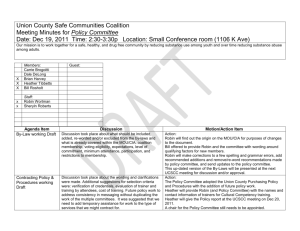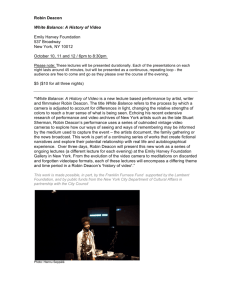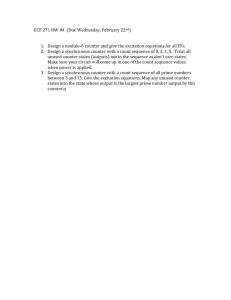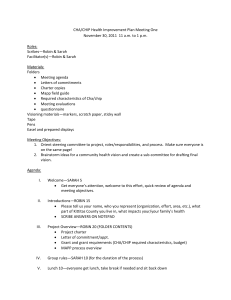At Counter No. 3 Revised
advertisement
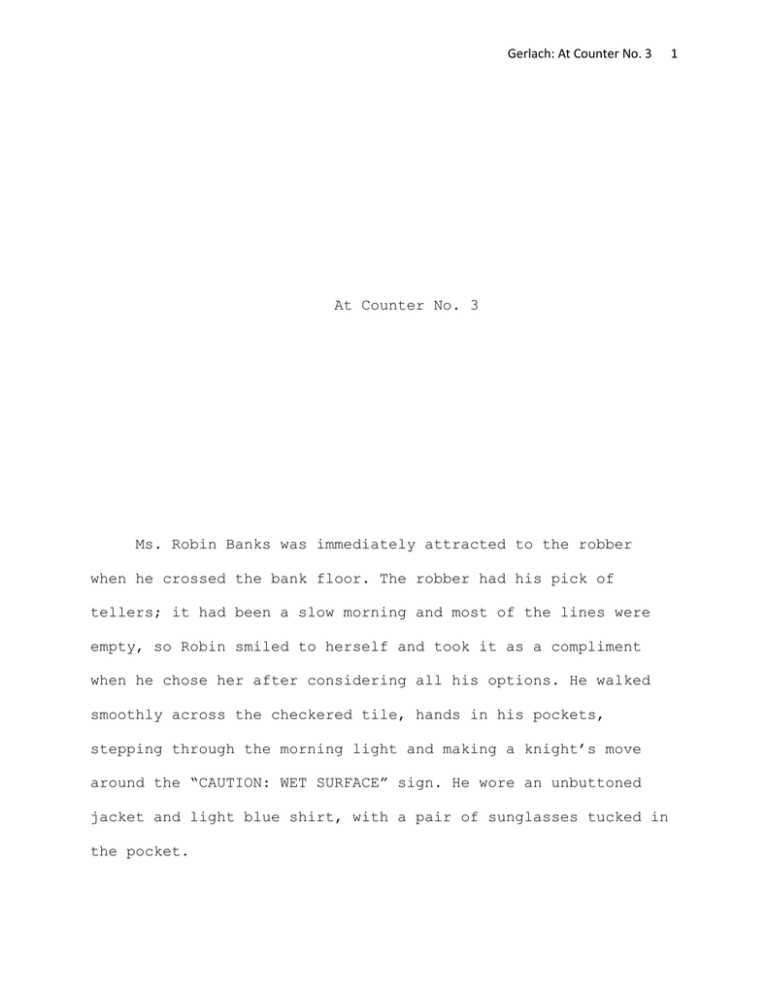
Gerlach: At Counter No. 3 At Counter No. 3 Ms. Robin Banks was immediately attracted to the robber when he crossed the bank floor. The robber had his pick of tellers; it had been a slow morning and most of the lines were empty, so Robin smiled to herself and took it as a compliment when he chose her after considering all his options. He walked smoothly across the checkered tile, hands in his pockets, stepping through the morning light and making a knight’s move around the “CAUTION: WET SURFACE” sign. He wore an unbuttoned jacket and light blue shirt, with a pair of sunglasses tucked in the pocket. 1 Gerlach: At Counter No. 3 He came up to Robin’s counter and she greeted him with a sunny smile, leaning forward and asking how his morning was. He didn’t respond but slid an empty money bag to her, followed by a folded scrap of paper. They looked at each other for a few seconds. Robin knew that most robberies these days started with a note-slide, and a moment later the man confirmed his intention. He drew back his jacket, quickly, like he was straightening out the shoulders, and revealed a small gun, covered with black tape. Robin read the note, and her body locked into place. The robber had chosen the right teller, more out of luck than hunter’s intuition. Both the tellers at No. 1 and No. 7 were unflappable women, and No. 8, though her rainbow makeup might suggest otherwise, had been the only girl on her high school football team and single-handedly tackled three robbers over her career at Harrington Bank and the Wells Fargo. Many tellers in the States will experience a bank robbery at some point during their career, at least second-hand, but Robin had no such experience. Even so, she remembered the training video “Study-Up For a Stick-Up,” and its ten pointers acted out by a woman in a clownish red-wig. Number one: let the robber have the money; the sooner he has what he wants, the sooner the will leave. Robin unlocked the 2 Gerlach: At Counter No. 3 drawer and scooped up hundreds first, then down to ones. She did this slowly. Number two: the most heroic thing you can do in a robbery is to remember physical details about the robber. However, avoid staring. Under no circumstance should you or anyone in the bank try to stop the robbery with force. Robin had already scanned him up and down, but she took another peek. He had a baby face, and some odd facial features, but each came together in a pleasant way. He might have been four or five years younger than Robin. He had long blonde hair and hooded eyelids, very blue eyes, cheeks a little full, a straight line for a mouth. From across the floor his walk seemed even, but up close Robin could identify small details that ruined any hope of this boy intimidating anybody. She could see a vein pulsing in his neck and on the counter his hands were tensed into claws. Even though her whole body was seizing too, (spine, forearms, legs, sweating fingertips) she knew that this robber had no idea what he was doing. Firstly, he didn’t have to show her the gun at all. His fingers were quivering and in the Western ghost-town setting of Robin’s mind, the sheriff would catch this cowboy any time. When this kid got caught his charge would be knocked up to include “with a deadly weapon.” He would go to jail, he’d get kicked around and his mother would miss him. 3 Gerlach: At Counter No. 3 Robin mentally shuffled through the rest of the tips. The alarm button was four inches away from her left hand. The steady whirr of counter machines and ballpoint pens never stopped, and the other tellers were oblivious to the robbery at hand. Robin also realized that she was catching him in medias res and for this little moment, at counter no. three in the steady rain of bank machinery and bystanders caught in dreamland, Robin knew more about this stranger than anyone else in the world. She knew he was young enough, old enough and desperate enough to rob a bank, to do it poorly, and be shaking at the sight of a teller wearing a light blue, polka dot dress with a silver clasp in her hair. The robber would never tell his mother he was robbing a bank. He would never tell his best friend how he nearly threw up on the mahogany counter. If he had any starving children for which he was stealing, Robin doubted he would ever pass down this particular story to the collection of fatherly mythologies. He was committing one of the three evil acts that all normal people will commit at some point in their life. Robin pretended to count out the money she was stacking in the bag. She counted silently, exaggerating with her lips, getting that mechanical wrist motion going as she flicked through the bills. She was into the five hundreds now and her precision was making this stick up look far better than the robber could ever hope for. He didn’t ask her to spread the 4 Gerlach: At Counter No. 3 money out on the counter. If he had, he would have seen the dye pack. She imagined him ripping into the bag later and getting blasted with scarlet ink. Robin thought back on the most evil things she had ever done. Once when she was twenty-five, she was laid off. She drove home early, head ringing from the dry evening heat. She stopped by a Kroger to pick up ingredients for Spaghetti Bolognese, but she was so distracted that when she pulled into a parking space, she rammed into the side of a Ford Windstar, leaving a threefoot gash in the left side of the car. There was no way she could afford to pay for the damages. The Windstar had other dents and scratches anyways, so she checked the lot for witnesses and slid back out onto the bypass. Another time she had stolen a coat at a New Year’s party. It was -2 degrees outside, roads slick with black ice, and her coat was too light. But when she took it home she found the pockets were inlaid with iridescent, ridiculous fabric and there was a funny smell at the neck of the coat. She threw it away the next day. So two things, neither so bad. She was capable of worse. There were other things of course, but nothing that sent her heart into a frantic six-eight time. Robin finished with the money bag and now the boy was sweating and breathing a little too hard. A strawberry flush heated his face and Robin was glad he had forgone a balaclava. 5 Gerlach: At Counter No. 3 He rolled on the heels of his feet and judged the height of the counter. The sequence played over his face. He could pull out the gun and hit all of the registers. He could scream and stamp and tell everyone on the ground to get on the ground. He glanced at the guard’s position. Teller number one passed behind Robin to take a lunch break, and the manager, an ancient man who called old women “young lady,” wandered off to the bathroom. Security camera lenses focused. Robin leaned forward and spoke in a low commercial voice. “That’s $736.75 from the drawer. I can’t take anymore without someone noticing.” She reached out a hand across the counter, as if to soothe him. His hand clutched the gun from outside his jacket. He still wouldn’t respond, as though speaking would ruin his invisibility. He grabbed the bag from the counter and hid it in his jacket. He did an odd little pivot that again showed his anxiety-charged motor skills. He made for the exit. She took three deep breaths and slid her fingers down to the alarm button. She ran her thumb around it. What kind of person was she? She quickly thought out the facts. She was thirty-one. She had put on five pounds since college. She called her father on Sundays. Mr. Banks was an uneasy patriarch with health that never deteriorated, even in his old age, despite his dissatisfaction with life and seasonal bouts of depression. After Robin’s mother died he tried to be 6 Gerlach: At Counter No. 3 didactic enough for two parents, often telling Robin what to do with her tampons or how to dress herself for formal occasions, but the only real lesson that ever stuck with Robin was that she could expect to not do as well as the generation before her. She spent a great deal of her work day running and rechecking the bill counters. At first she enjoyed the rigmarole of daily life, shooting deposits up suctioned pipes, spinning vault wheels and drinking the free coffee, but once the novelty faded she had to train her brain to either entertain itself or wipe blank. She chewed her gum on the left side of her mouth, then on the right. She crossed and uncrossed her legs, filled out crosswords and took too much time for lunch. She had held dollar bills under microscopes, finding the tiny owl on the top right corner, had dreams of unfinished pyramids and all-seeing eyes. She touched hundreds of thousands of dollars until the cotton and linen fibers meant absolutely nothing to her. Outside of work, she had a few brief relationships, often with married men, but each ended inconclusively. Some nights she would have late dinner with one guy, take him back to her 5th floor apartment for a trial round of sex, just to feel things out, then he’d stumble out at 4 a.m. and she’d never hear from him again. She’d rearrange her countless throw pillows in the morning and regret having nothing to daydream about. 7 Gerlach: At Counter No. 3 This was the boy’s first robbery. That much was clear. Robin’s father insisted that with the economy, job market, and environment, she should never expect too much. She had gladly leapt into accounting. She never moved out of Illinois. She never asked for too much or asked that her married men leave their wives. The young man in the blue shirt, cash stashed in his pockets, sweat staining the underarms of his shirt, was taking what he needed. Maybe he had never expected too much either, but here he was taking what he could out of life. He passed the security guard, a giant ginger-haired man reading a paperback book, giving him a little glance before getting through the door and quick walking onto the sidewalk. It was a beautiful day outside. The sun had reached its apex and a light humidity has settled in the air. The daffodils were in full bloom in the quartered spaces of grass. Robin stared out the great window of the bank at the cross walks, the shoes and brightly dressed people. The young man darted down the sidewalk, occasionally checking over either shoulder. Robin took her finger off the button, feeling like her body was tearing her into two different directions. She could stay in the stale air of the bank, running tasks, depositing and cashing and transferring her interest in life, finding ways to pass time, budgeting herself and calling her father on Sundays. 8 Gerlach: At Counter No. 3 She tossed the wooden “next counter please” plate onto the counter. One eye on the window, she grabbed her bag, stuck her gum under the counter and darted around the partition. None of the tellers called out to her or asked if she wanted to go to lunch. She didn’t knock on the president’s door to quit. She ran out of the bank, stumbling over the doorway and sprinted after the robber. He last crossed at the corner of Main St. and West King. She searched as fast as she could, sorting out the wrong colors: pink, orange, gray, needing the blue and blonde combination. He needed someone to teach him how to really rob banks. He would need help deactivation the dye pack at the very least. She dodged pedestrians and raced across during a walk light, made an excited leap towards the sidewalk and broke the heel of her shoe clean off. She fell flat onto the sidewalk, catching herself with her palms, but spilling the contents of her bag all over the place. She scrambled up and went about putting things back in her bag. She stood back up and pushed the hair out of her face. She looked around for the robber again, but she had lost him. Traffic lights and walk ways had changed one or two too many times and the people occupying these roads now had been shuffled. People she had never meet were swapped in an out as the crowds moved East, West, North and South and the robber was gone. 9 Gerlach: At Counter No. 3 10 She took a deep breath, removed her shoes and ducked into a delicatessen nearby. She wasn’t hungry and slipped into a window-side booth, folding her bare feet under the seat. She examined her tights. The fall had ruined them. She thought about the bag of money stowed in a jacket pocket somewhere. There was over seven hundred in cash in the bag. Her phone vibrated in her purse. There was no way she could explain not hitting the emergency button. The phone kept buzzing. She took the phone out; her work number flashed on the screen. She didn’t answer it but crumpled a little, cradling her head in her hands, massaging her temples and thinking, thinking what could she do? The phone kept buzzing. She started to cry.
